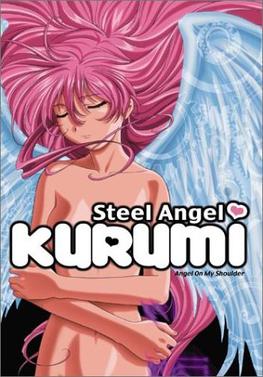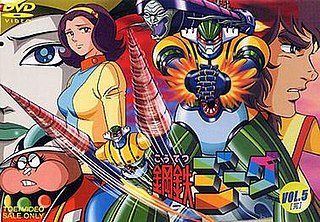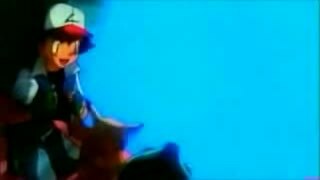
The WB Television Network was an American television network launched on broadcast television on January 11, 1995, as a joint venture between the Warner Bros. Entertainment division of Time Warner and the Tribune Broadcasting subsidiary of the Tribune Company, with the former acting as controlling partner. The network aired programs targeting teenagers and young adults between the ages of 13 and 34, while its children's division, Kids' WB, targeted children between the ages of 6 and 12.

Wowow is a satellite broadcasting and premium satellite television station owned and operated by Wowow Inc. (株式会社WOWOW). Its headquarters are located on the 21st floor of the Akasaka Park Building in Akasaka, Minato, Tokyo. Its broadcasting center is in Koto, Tokyo.

4Kids TV was an American television programming block and Internet-based video on demand children's network operated by 4Kids Entertainment. It originated as a weekly block on Saturday mornings on the Fox network, which was created out of a four-year agreement reached on January 22, 2002, between 4Kids Entertainment and Fox to lease the five-hour Saturday morning time slot occupied by the network's existing children's program block, Fox Kids. It was targeted at children aged 7–11. The 4Kids TV block was part of the Fox network schedule, although it was syndicated to other broadcast television stations in certain markets where a Fox affiliate declined to air it.

Kids' WB was an American children's programming service and brand of The WB that aired on the network from September 9, 1995, to September 16, 2006. The block moved to The CW, where it aired from September 23, 2006, to May 17, 2008. After the block was discontinued, its Saturday morning programming slot was sold to 4Kids Entertainment and replaced by its successor block, The CW4Kids.

ABC Kids was an American Saturday morning children's programming block that aired on ABC from September 13, 1997 to August 27, 2011. It featured a mixture of animated and live-action series from Walt Disney Television Animation and Disney Channel, aimed at children between the ages of 6 and 14. This was the only time Disney Channel content aired on over-the-air television in the United States.
Toonami is an American late-night television programming block that broadcasts Japanese anime and American action animation. It was created by Sean Akins and Jason DeMarco and produced by Williams Street, a division of Warner Bros. Television Studios, and owned by The Cartoon Network, Inc. subsidiary of Warner Bros. Discovery. The name is a portmanteau of the words "cartoon" and "tsunami". It currently broadcasts every Saturday night from 12 a.m. to 3 a.m. ET/PT.

Fox Kids was an American children's programming block and branding for a slate of international children's television channels. Originally a joint venture between the Fox Broadcasting Company (Fox) and its affiliated stations, it was later owned by Fox Family Worldwide.

Steel Angel Kurumi is a Japanese manga series created by Kaishaku. An anime series adaptation directed by Naohito Takahashi, animated by Oriental Light and Magic, produced by Pony Canyon with character designs by Yuriko Chiba and Yūji Ikeda and music by Toshihiko Sahashi has been translated and released in North America by ADV Films. In 2008, Crunchyroll announced it had partnered with Pony Canyon to release the Steel Angel Kurumi series for streaming and download. The entire series was compiled in a Blu-ray box set by Pony Canyon on September 19, 2012.
Eri Sendai is a Japanese actress and voice-actress from Japan. Her major roles in anime include Mimino Kurumi/Milky Rose in Yes! Precure 5, Saotome Rei in Yu-Gi-Oh! GX, Sa Kōrin in The Story of Saiunkoku, Morita Yukari in Rocket Girls, Shimbara Yuuhi in Neo Ranga, and Arika in Medabots.

Steel Jeeg, also known as Kotetsu Jeeg or Koutetsu Jeeg, is a Japanese mecha anime series created by manga artists Go Nagai and Tatsuya Yasuda and produced by Toei Doga, directed by Masayuki Akehi. It was first broadcast on NET in Japan from October 5, 1975, to August 29, 1976, lasting for 46 episodes. Steel Jeeg also ran as a manga in several children's publications, with the original manga was first serialized in Kodansha's TV Magazine from August 1975 to June 1976.
Pokémon is an anime television series that originally debuted in Japan on April 1, 1997. Throughout its run of over 1,200 episodes, specific episodes have been unaired or pulled from rerun rotation in certain countries while others have been altered or entirely banned, some of which include racial stereotyping such as Jynx and the characters appearing in blackface. Notably, the globally banned episode "Dennō Senshi Porygon", which aired only once on Japan's TV Tokyo on December 16, 1997, features a series of rapidly alternating red and blue frames that provoked epileptic seizures in hundreds of children.
KQEH, branded on-air as KQED Plus, is a PBS member television station licensed to San Jose, California, United States, serving the San Francisco Bay Area. The station is owned by KQED Inc., alongside fellow PBS station KQED and NPR member KQED-FM (88.5) in San Francisco. The three stations share studios on Mariposa Street in San Francisco's Mission District and transmitter facilities atop Sutro Tower; until January 17, 2018, KQEH's transmitter was located atop Monument Peak.

"Dennō Senshi Porygon" is the 38th episode of the Pokémon anime's first season. Its sole broadcast was in Japan on December 16, 1997.
In Japan, late night anime refers to anime series broadcast on television late at night or in the early hours of the morning, usually between 11 PM and 6 AM local time.

Super Hero Time is a programming block on the Japanese television network TV Asahi featuring new episodes of tokusatsu television series from the Super Sentai, Kamen Rider and Metal Heroes. Both series have decades of history and have been intertwined in the public imagination for some time, not least of all because the driving creative force behind both was manga artist Shotaro Ishinomori and both were produced by the same production company, Toei Company; however, they did not air together until 2000 with Kamen Rider Kuuga and Kyuukyuu Sentai GoGoFive, though at the time they were not acknowledged together. Super Hero Time airs every Sunday morning, from 9:00 to 10:00 JST. The block is shown all over Japan via the All-Nippon News Network. Though, in other prefectures, one or both shows can be seen on other stations which are not affiliated with ANN.

Cartoon Network is an Indian cable and satellite television channel operated by Warner Bros. Discovery under its international division. The channel is the Indian equivalent to the original American network and was launched on 1 May 1995 as the first television network in India dedicated to children. The channel primarily airs animated programming in Hindi, Tamil, Telugu, Kannada, and Malayalam.
Animax was a Latin American cable television channel, serving as the regional variant of the Japanese network of the same name. It was launched on 31 July 2005, replacing Locomotion, which was acquired by Sony on 18 January of the same year. Animax was divided into four feeds: three in Spanish and one in Portuguese (Brazil).










